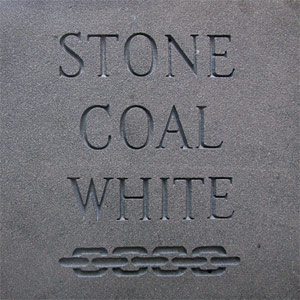
Stone Coal White
Cali-Tex/Numero Group
Given that last week’s Past Perfect reviewed an unearthed gem from Washington DC’s Father’s Children, it’s safe to assume that the Numero Group rarely rests when it comes to their archeological quests. Equally fascinating and forgotten is the release by Dayton, Ohio’s Stone Coal White. The band never made a proper full-length, and unless you were among the very lucky denizens who frequented the Astro Club or the Bone Yard in 1972—or are a very astute record collector—you’ve never heard or heard of the band. Their two 45s released on the micro Ewing label have eluded any lost soul compilations that might accommodate songs of this ilk. Luckily, Numero’s chief investigator, Dante Carfagna, and Josh Davis (a.k.a. DJ Shadow) were big fans of said 45s and followed a long, arduous trail leading them to former Stone Coal White bassist Melvin Payne and the remaining pieces of the Stone Coal White mystery.
As Carfagna writes in the liner notes, Stone Coal White lived and created in the “deepest chasm of the black experience,” going beyond the underground at a time when Dayton was home to the Ohio Players and a heralded funk and soul scene. They were a motorcycle gang, prone to gnarly pornographic, drugged-out stage shows (they were often billed with a “XXX” after their name), and subsequently had a very unstable and short-lived existence. Fortunately, Payne was able to locate the entirety of Stone Coal White’s recorded output. What Carfagna found may only amount to a few covers of songs from the time (Curtis Mayfield’s “Hell Below” and Bill Withers “Ain’t No Sunshine”) and the lengthy instrumental jam, “Warm Up,” but combined with the group’s original songs, it’s a stunning document of an absolutely raw, funky, acid-fueled moment in time.
What set Stone Coal White apart from their contemporaries laid in technique and fidelity. Their best known track, the sweaty slow-burn of “You Know,” is steeped in gooey wah-wah and panned from left to right at an increased frequency, making for quite a unique psychedelic experience. What seems like an eternity due to strategic uses of echo and reverb, really only lasts for four minutes. Even stranger is the straight-up Redding-soul of “Peoples,” which wouldn’t sound that out of place on many of the regional Numero series. In the hands of Stone Coal White, “Peoples” becomes a warped and slightly burnt-out piece of protest against Vietnam. In passing, tunes like “Free” and the group’s riled theme song might come across as pedestrian or amateur, and that would be a fair assessment, but zooming in on the history that surrounded them makes these recordings all that more profound. Focusing on the tiny eccentricities that dot these recordings makes it all the more real to those of us (perhaps everyone reading this) who never had the chance to experience a live Stone Coal White show. Stone Coal White was never meant to be Sly and the Family Stone, and they likely never had aspirations to be such. But for the handfuls of Daytonians who were a part of the racial and socioeconomic tumult that defined their urban landscape in the early ’70s, they were probably the Gem City’s perfect escape on a Saturday night.
Kevin J. Elliott
PAST PERFECTS
Paul McCartney, McCartney and McCartney II
Peter Tosh, Legalize It and Equal Rights
Sebadoh, Bakesale
Love, Black Beauty
Reatards, Teenage Hate
DOA, Something Better Change and Hardcore 81
Simple Minds, Sparkle in the Rain
Mercury Rev, Deserter's Songs
Blank Dogs, Collected By Itself: 2006-2009
The Kinks, Kinks, Kinda Kinks and The Kink Kontroversy
The Zeros, "Main Street Brat" and The Normals, "Almost Ready"
Pearl Jam, Vs. and Vitalogy
Swearing at Motorists, Postcards from a Drinking Town
Talk Talk, Spirit of Eden
